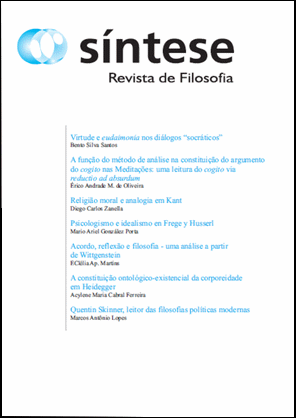VIRTUDE E EUDAIMONIA NOS DIÁLOGOS “SOCRÁTICOS”
DOI:
https://doi.org/10.20911/21769389v37n117p5-26/2010Palavras-chave:
Alma, bem, eudaimonia, virtude, ética.Resumo
À luz de vários textos do corpus platonicum, o artigo procura estabelecer uma concepção do eudaimonismo socrático a partir da controvérsia suscitada por T. Irwin em seu Plato's Moral Theory. Ao examinar a significação do eudaimonismo de Sócrates, propomos uma posição intermediária entre a tese de T. Irwin - segundo a qual a virtude é o meio instrumental para chegar à felicidade - e a que estabelece a identidade entre virtude e felicidade. A significação mais plausível do eudaimonismo de Sócrates consiste no seguinte esquema “pluricomponencial”: mesmo afirmando a soberania da virtude, necessária e suficiente à felicidade, tal esquema admite que a felicidade compreende igualmente múltiplos componentes menos importantes que a virtude. Este modelo mais abrangente permite descortinar o lugar real de Sócrates no desenvolvimento do pensamento grego: ele foi o primeiro a estabelecer as bases eudaimonistas da teoria ética.
Abstract: In the light of several texts of the corpus platonicum, this article seeks to establish a conception of Socratic eudaimonism starting from the controversy raised by T. Irwin in his Plato's Moral Theory. In examining the significance of Socrates' eudaimonism, we propose an intermediate position between T. Irwin's thesis – according to which virtue is the instrumental means to reach happiness - and the one that establishes the identity between virtue and happiness. The most plausible meaning of Socrates' eudaimonism consists in the following “multicomponent pattern”: even when claiming the sovereignty of virtue, which is necessary and sufficient for happiness, such a scheme assumes that happiness also contains multiple components that are less important than virtue. This wider model allows unveiling Socrates' true place in the development of Greek thought: he was the first to establish the eudaimonistic bases of the theory of ethics.


















